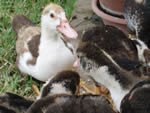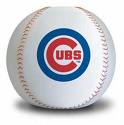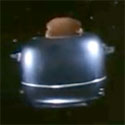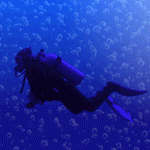Distilled water?
Re: Distilled water?
My dining room table insists that only distilled water be served on it.
_________________
| Machine: DreamStation BiPAP® Auto Machine |
| Mask: DreamWear Nasal CPAP Mask with Headgear |
jeff
Re: Distilled water?
That must be some GOOD chlorine you've been snortin'!jdm2857 wrote:My dining room table insists that only distilled water be served on it.
The OSA patient died quietly in his sleep.
Unlike his passengers who died screaming as the car went over the cliff...
Unlike his passengers who died screaming as the car went over the cliff...
Re: Distilled water?
From http://www.talkaboutsleep.com/cpap-humi ... /index.htm Bolding is my emphasis.
Cleaning & Maintenance
Just like your CPAP device, proper cleaning and maintenance of your humidifier is essential in increasing the comfort of your therapy and ensuring it is working properly. It is highly recommended that you use distilled water to maximize the life of your humidifier’s water chamber and reduce mineral deposits. (However, it is ok to occasionally use tap water to clean your humidifier.) Do not use bleach, alcohol, chlorine or ammonia-based solutions; moisturizing, antibacterial or glycerin-based soaps; or water softening and unapproved descaling agents.
You should also change the water in the chamber for each use, even if you do not use it all in one night’s time. We suggest washing your humidifier and tubing daily in warm water using a mild detergent. Rinse them thoroughly with clean water and allow them to dry away from direct sunlight. Inspect the water chamber weekly for wear and deterioration. Replace the water chamber right away if any component has cracked, become cloudy or pitted. If you notice white powder or deposits in the water chamber, follow these steps:
Fill the water chamber to the maximum water level and mark with a solution of one part vinegar to ten parts water.
Let the solution soak for 10 minutes.
Discard the solution and rinse the water chamber with clean water.
ResMed S9 range 9.8-17, RespCare Hybrid FFM
Never, never, never, never say never.
Never, never, never, never say never.
Re: Distilled water?
I only use distilled water, and I haven't seen a trace of mineral deposits. I would think a diluted chlorine bleach mixture wouldn't hurt anything, as long as you rinse it well; I don't know for sure. Personally, I can't stand the smell of bleach. Something about it makes me gag.
What does the Control III smell like?
What does the Control III smell like?
_________________
| Machine: ResMed AirSense™ 10 AutoSet™ CPAP Machine with HumidAir™ Heated Humidifier |
| Mask: AirFit™ P10 Nasal Pillow CPAP Mask with Headgear |
| Additional Comments: 15-18 cm, EPR 1, PAPcap |
Sleep well and live better!
Re: Distilled water?
It appears the folks that make and sell the equipment DO know for sure. They're against it....and not for health reasons.tattooyu wrote:I would think a diluted chlorine bleach mixture wouldn't hurt anything, as long as you rinse it well; I don't know for sure.
The OSA patient died quietly in his sleep.
Unlike his passengers who died screaming as the car went over the cliff...
Unlike his passengers who died screaming as the car went over the cliff...
Re: Distilled water?
Then there you have it.
_________________
| Machine: ResMed AirSense™ 10 AutoSet™ CPAP Machine with HumidAir™ Heated Humidifier |
| Mask: AirFit™ P10 Nasal Pillow CPAP Mask with Headgear |
| Additional Comments: 15-18 cm, EPR 1, PAPcap |
Sleep well and live better!
Re: Distilled water?
Besides, since they sealed up all the car batteries, the distilled water industry needs all the help it can get!!
Re: Distilled water?
I've used filtered tap water (run through a PUR 2-stage filter) without any problems. I usually keep my humidifier on a 1 setting though and it doesn't run out of water so that could be why it has never built up any scale. I did think it smelled kinda funny though so I'm distilling some water now. I don't like to run the distiller because it's a energy hog and I don't use much water in it. If you let it sit in those plastic jugs it starts to smell awful like plastic.
sarasmyly wrote:So this may be a stupid question, but I'm a newbie and was wondering...
Does it really matter what kind of water you put into your humidifier? My doctor told me I had to use distilled water. So I have been buying the big jugs of it and pouring it into my humidifier... but it would be much easier to just use the sink! Does distilled water really make a difference?
I appreciate the help!
_________________
| Machine: ResMed AirSense™ 10 AutoSet™ CPAP Machine with HumidAir™ Heated Humidifier |
| Additional Comments: Respironics Simplicity nasal mask small |
Re: Distilled water?
From the respironics System One humidifier manual:
"Use only room temperature distilled water in the tank. Do not put any chemicals or additives ino the water. Possible AIRWAY IRRITATION or damage to the water tank may result."
"Use only room temperature distilled water in the tank. Do not put any chemicals or additives ino the water. Possible AIRWAY IRRITATION or damage to the water tank may result."
RRT/DME provider
Re: Distilled water?
Thank you all for your replies! Even though it stirred up a bit of an argument... haha. I'll make sure to stick to distilled though... just seems like the best bet.
The ironic thing, though, is that I rarely even use my humidifier. Most nights I keep it on 0. When I first started to use my CPAP, water would leak down the tube and into my nose, and I would wake up snorting water. I tried turning the humidifier down, and down, but the same thing happened. Then my doctor told me that my habit of keeping my room cold and sleeping with my fan on was what was causing the water/condensation. But turning the thermostat up and the fan off didn't help much either. So my doctor's office gave me a "sock buddy" as they called it. I don't know what the actual name for it is. All I know is that it's a fuzzy gray "sock" thing from Respironics that you fit over your tubing. It is supposed to stop condensation, and it does work to some extent, but I still rarely turn up the humidifier. I think it's more of a psychological thing now... It was just so miserable waking up snorting water!
It seems that most everyone else loves their humidifier though. Any reasons why I should give it another shot?
The ironic thing, though, is that I rarely even use my humidifier. Most nights I keep it on 0. When I first started to use my CPAP, water would leak down the tube and into my nose, and I would wake up snorting water. I tried turning the humidifier down, and down, but the same thing happened. Then my doctor told me that my habit of keeping my room cold and sleeping with my fan on was what was causing the water/condensation. But turning the thermostat up and the fan off didn't help much either. So my doctor's office gave me a "sock buddy" as they called it. I don't know what the actual name for it is. All I know is that it's a fuzzy gray "sock" thing from Respironics that you fit over your tubing. It is supposed to stop condensation, and it does work to some extent, but I still rarely turn up the humidifier. I think it's more of a psychological thing now... It was just so miserable waking up snorting water!
It seems that most everyone else loves their humidifier though. Any reasons why I should give it another shot?
- spacetoast
- Posts: 174
- Joined: Mon Aug 10, 2009 4:23 pm
- Location: Golden, CO
Re: Distilled water?
Sounds like "rain out"sarasmyly wrote: When I first started to use my CPAP, water would leak down the tube and into my nose, and I would wake up snorting water.
There are a ton of threads discussing solutions for it on this site.
Here's one thread with a pic that might help. Also, follow the link RestedGal posted about the Aussie heated hose.
viewtopic.php?f=1&t=40597&p=355307&hili ... rd#p355307
I probably ought to get on this myself since cooler weather is around the corner.
Re: Distilled water?
Even on 0 you will get some humidification as long as you have water in it. It's called "passover mode". That's where I keep mine, and get about 3 nights out of a tankful. I never get rainout in passover...but I also have a flannel hose cover (for comfort when I roll over on the hose).sarasmyly wrote:Most nights I keep it on 0.
The OSA patient died quietly in his sleep.
Unlike his passengers who died screaming as the car went over the cliff...
Unlike his passengers who died screaming as the car went over the cliff...
Re: Distilled water?
They are correct. Using other than distilled water may result in tank damage. And putting certain undefined additives "ino" the water may result in airway irritation. They obviously have good lawyers covering all their basses.CpapRRT wrote:From the respironics System One humidifier manual:
"Use only room temperature distilled water in the tank. Do not put any chemicals or additives ino the water. Possible AIRWAY IRRITATION or damage to the water tank may result."
The OSA patient died quietly in his sleep.
Unlike his passengers who died screaming as the car went over the cliff...
Unlike his passengers who died screaming as the car went over the cliff...
- DreamDiver
- Posts: 3082
- Joined: Thu Oct 04, 2007 11:19 am
Re: Distilled water?
To clarify, there are a number issues here:
Tap water: is it good or bad for your health, and is it good or bad for your machine?
Filtered water: how does it affect my machine?
Distilled water: The best choice?
What's most economical, most environmentally sane, safest?
Mineral Deposits and Tap Water.
Calcium and other minerals build up a deposit in the humidifier tank. Some well water or stream water contains surprising amounts of iron. If I were to use well water from where we used to live in New Jersey, the tank would have a rust line on the tank interior in about an hour. The water itself would be a cloudy rust color. The ring of rust would become permanent if I left it overnight. (Straight out of the ground, though, it was delicious!)
Some well water is so full of calcium the calcium deposits can create scale you can flake off in days. Most of us don't live with that kind of tap water and only see a slightly white film on the inside of the tank after a number of days. Those of us living in an area with naturally mineral-free water sources for the public tap are blessed with less of a problem. With regards to minerals, tap water is another chore. You can use tap water if you absolutely have to, but why create a mess you'll have to clean up later?
Halogens and Tap Water
Depending on the regulation of your local public water utility, tap water can have quite a variety of concentrations of Chlorine. Some public utilities are now beginning to use bromine, another halogen that is supposed to be less harsh to humans, but just as effective against germs. Chlorine is only minimally used in the human metabolism. In North Carolina, some school cafeterias use only the smallest amount of chlorine in a spray bottle to clean cafeteria tables. They basically dip the end of the spray bottle uptake straw into a bottle of chlorine. The excess chlorine is allowed to drip off. The amount that remains on the end of the straw is mixed with a whole quart of water in the spray bottle. They then test the spray water to make sure the concentration of chlorine is in an acceptable range with a paper dip tab. This spray is sufficient to kill 97% of the germs that reside on cafeteria tables. That's not a lot of chlorine. A kid could drink the contents of the bottle by mistake and not even blink. The amount in tap water is supposed to be even less, but for some reason, it smells more potent when it's coming out of the tap. It's one thing for a kid to do it by mistake, but to expose your lung tissue to even small concentrations of outgassing chlorine, fluorine and/or bromine seems like an unnecessary health risk. Humans are not made to breathe chlorine gas. We only have a few decades of real research on the overall effects of chlorine on humans and the environment, and most of the data is incidental. Chlorine gas kills germs. What else is it doing to us in the process?
Anyone ever put tap water straight into an aquarium full of fresh-water fish? No. The chlorine would kill your fish. Why expose ourselves to something we really know so little about, when all the environmental figures point to danger?
Filtered Water
There are varying degrees of filtered water. Most faucet-mount and pitcher-style filters replace 'impurities' with mineral salts that make the water taste more pleasant, but you're replacing one thing for another. The salts left in this type of filtered water will still leave a deposit in your tank. Under-the-sink filters can offer more options, but many still use the salt-replacement method. Many of these filters remove only a modicum of the halogens.
Many table-top and under-the sink models come with multi-phase filters: one for larger particles, one for smaller particles, one for outgassing, etc. Some even allow you to mix and match depending on your tap water. Some table-top and under-the-sink filters use an additional process called reverse osmosis, or RO, where a semi-permeable membrane uses the flow of the water itself and water's inate physics to remove minerals after the salt-filter is used. Depending on the efficacy of the RO filter, this kind of filtration is just a tiny step below distilled water with regards to purity.
Some filter systems also offer UV radiation to kill germs prior to consumption - usually inserted somewhere between primary filtering and other phases of filtering, but before RO.
There are whole-house systems that do all of the above to varying degrees. If you live on Topsail Island, NC, you really cannot live in a house without in-house filtration at least for particles, germs and salt. The tap water still smells like ocean. You simply cannot drink it, but but the public water utiltiy declares that it's safe to shower in.
The French Broad Food Co-op in Asheville, NC uses only RO water for all its endeavors, from cooking to washing. This tap water actually is safe right out of the kitchen tap, but only because they made it so.
So for filtered water, the only really reasonably filtered water appropriate for use in your tank is RO water. There are still too many minerals in faucent-mount and pitcher-style filters, and no guarantee that halogens are reasonably reduced.
Bottled Water
You have no idea where this came from. Unless it states that it is distilled, for all you know, this is water coming from a tap in New York City. That said, much of NYC has some of the cleanest and purest tap water in the world, primarily because it's water lines are fed from mountain streams far away from the city. However, just because it's bottled doesn't mean it's pure. NRDC came out with a report on bottle water that does not put the industry in a very positive light when it comes to contamination. Even big-name brands are implicated as less-than-safe. Unless the bottle says 'distilled' or 'reverse osmosis' on it somewhere, the water could be worse than tap water, for all you know. This industry is woefully under-regulated.
Distilled Water
Distilled water is probably the safest water because it is the purest. There's not much more to be said about it than that.
The real price of the water you choose.
Tap water - Money and energy are expended by your public utility to make the water clean enough to drink 'safely', according to government regulations. This is probably the least expensive water to put in your tank, but it comes at the cost of your having to clean the tank every once in a while, and the unstudied medical concerns over breathing in noticeably-concentrated halogens over an extended period of your lifetime.
Filtered water - Beyond the money spent by the public utility (your tax dollars at work), you are now adding the additional expense of the filtering system, plus replacement filter parts, whatever style they may be. All filter systems have parts that need replacing as they clog with debris and contaminants. The ecological cost of making the filters and landfilling or attempting to recycle them comes into account to. Reverse osmosis has an additional environmental cost in that for every pint of water purified, a considerable number of pints of water are wasted as runoff. An under-the-sink system could waste many thousands of gallons in a year just to give you the hundreds of gallons you need to wash your vegetables and dishes. If you live in a town where tap water is costly, that could put a dent in your wallet, too.
Distilled Water - You don't have to pre-filter water you're distilling from your tap, but you will have to clean out the input tank on the distiller everyone once in a while, so you're just transferring the cleaning process from your humidifier tank to the distiller tank, if you own a table-top water distillery. There is generally less runoff water caused in distilling water, but you additionally expend energy in having to heat it to boiling, and then cooling the water to distill it. Traditional distilleries use a running source of cold water to cool the distilling water. Today, the distilling coils can be chilled electronically, but that's still an energy expense.
The two safest, cleanest methods - RO and Distilled - both come at a significant energy and environmental price. When you add up the cost of water for RO and compare it to the cost of heating and cooling for Distilled, they probably come close. But then for RO, you have to add in the cost of the filters and the enviromental cost of landfilling/recycling them. The distillery tank just needs to be cleaned with lemon juice or vinegar periodically. If I had to choose between the two, I think I'd choose distillery because it seems more environmentally sane than RO. I don't have to wonder what will happen to the filters and RO membrane in some landfill, or the environmental cost of creating more of the same.
Economically speaking, it's more about whatever is available. In the short-term, it seems more economical to buy RO water from a local supplier - like your co-op - than it is to buy a smaller, less-efficient RO machine than the professional one to which they provide access.
There are a lot of personal considerations too. If you can't afford RO or Distilled water from your local co-op or a health-food store, you're likely going to use tap water and just deal with the consequences of cleaning out the tank. If you do this, leave your water in a jug or pitcher at room-temperature with the top open for at least twenty four hours to let most of the chlorine and any other noxious gases escape - just like you might do for your aquarium. It will also give you a chance to see if anything will precipitate out of the water before you actually put it in your tank. You can clean the tank by soaking a slice of lemon or a little vinegar with a full compliment of water in the tank for about eight hours. Wash out with a little soap and your tank should have no residue.
The question of using distilled water is more about conscious choices. Using tap water is not the end of the world, but it is not suggested as the safest for your health or your machine. You're going to use what you have access to, but armed with a little knowledge, you can make better economic, environmental and health decisions.
Tap water: is it good or bad for your health, and is it good or bad for your machine?
Filtered water: how does it affect my machine?
Distilled water: The best choice?
What's most economical, most environmentally sane, safest?
Mineral Deposits and Tap Water.
Calcium and other minerals build up a deposit in the humidifier tank. Some well water or stream water contains surprising amounts of iron. If I were to use well water from where we used to live in New Jersey, the tank would have a rust line on the tank interior in about an hour. The water itself would be a cloudy rust color. The ring of rust would become permanent if I left it overnight. (Straight out of the ground, though, it was delicious!)
Some well water is so full of calcium the calcium deposits can create scale you can flake off in days. Most of us don't live with that kind of tap water and only see a slightly white film on the inside of the tank after a number of days. Those of us living in an area with naturally mineral-free water sources for the public tap are blessed with less of a problem. With regards to minerals, tap water is another chore. You can use tap water if you absolutely have to, but why create a mess you'll have to clean up later?
Halogens and Tap Water
Depending on the regulation of your local public water utility, tap water can have quite a variety of concentrations of Chlorine. Some public utilities are now beginning to use bromine, another halogen that is supposed to be less harsh to humans, but just as effective against germs. Chlorine is only minimally used in the human metabolism. In North Carolina, some school cafeterias use only the smallest amount of chlorine in a spray bottle to clean cafeteria tables. They basically dip the end of the spray bottle uptake straw into a bottle of chlorine. The excess chlorine is allowed to drip off. The amount that remains on the end of the straw is mixed with a whole quart of water in the spray bottle. They then test the spray water to make sure the concentration of chlorine is in an acceptable range with a paper dip tab. This spray is sufficient to kill 97% of the germs that reside on cafeteria tables. That's not a lot of chlorine. A kid could drink the contents of the bottle by mistake and not even blink. The amount in tap water is supposed to be even less, but for some reason, it smells more potent when it's coming out of the tap. It's one thing for a kid to do it by mistake, but to expose your lung tissue to even small concentrations of outgassing chlorine, fluorine and/or bromine seems like an unnecessary health risk. Humans are not made to breathe chlorine gas. We only have a few decades of real research on the overall effects of chlorine on humans and the environment, and most of the data is incidental. Chlorine gas kills germs. What else is it doing to us in the process?
Anyone ever put tap water straight into an aquarium full of fresh-water fish? No. The chlorine would kill your fish. Why expose ourselves to something we really know so little about, when all the environmental figures point to danger?
Filtered Water
There are varying degrees of filtered water. Most faucet-mount and pitcher-style filters replace 'impurities' with mineral salts that make the water taste more pleasant, but you're replacing one thing for another. The salts left in this type of filtered water will still leave a deposit in your tank. Under-the-sink filters can offer more options, but many still use the salt-replacement method. Many of these filters remove only a modicum of the halogens.
Many table-top and under-the sink models come with multi-phase filters: one for larger particles, one for smaller particles, one for outgassing, etc. Some even allow you to mix and match depending on your tap water. Some table-top and under-the-sink filters use an additional process called reverse osmosis, or RO, where a semi-permeable membrane uses the flow of the water itself and water's inate physics to remove minerals after the salt-filter is used. Depending on the efficacy of the RO filter, this kind of filtration is just a tiny step below distilled water with regards to purity.
Some filter systems also offer UV radiation to kill germs prior to consumption - usually inserted somewhere between primary filtering and other phases of filtering, but before RO.
There are whole-house systems that do all of the above to varying degrees. If you live on Topsail Island, NC, you really cannot live in a house without in-house filtration at least for particles, germs and salt. The tap water still smells like ocean. You simply cannot drink it, but but the public water utiltiy declares that it's safe to shower in.
The French Broad Food Co-op in Asheville, NC uses only RO water for all its endeavors, from cooking to washing. This tap water actually is safe right out of the kitchen tap, but only because they made it so.
So for filtered water, the only really reasonably filtered water appropriate for use in your tank is RO water. There are still too many minerals in faucent-mount and pitcher-style filters, and no guarantee that halogens are reasonably reduced.
Bottled Water
You have no idea where this came from. Unless it states that it is distilled, for all you know, this is water coming from a tap in New York City. That said, much of NYC has some of the cleanest and purest tap water in the world, primarily because it's water lines are fed from mountain streams far away from the city. However, just because it's bottled doesn't mean it's pure. NRDC came out with a report on bottle water that does not put the industry in a very positive light when it comes to contamination. Even big-name brands are implicated as less-than-safe. Unless the bottle says 'distilled' or 'reverse osmosis' on it somewhere, the water could be worse than tap water, for all you know. This industry is woefully under-regulated.
Distilled Water
Distilled water is probably the safest water because it is the purest. There's not much more to be said about it than that.
The real price of the water you choose.
Tap water - Money and energy are expended by your public utility to make the water clean enough to drink 'safely', according to government regulations. This is probably the least expensive water to put in your tank, but it comes at the cost of your having to clean the tank every once in a while, and the unstudied medical concerns over breathing in noticeably-concentrated halogens over an extended period of your lifetime.
Filtered water - Beyond the money spent by the public utility (your tax dollars at work), you are now adding the additional expense of the filtering system, plus replacement filter parts, whatever style they may be. All filter systems have parts that need replacing as they clog with debris and contaminants. The ecological cost of making the filters and landfilling or attempting to recycle them comes into account to. Reverse osmosis has an additional environmental cost in that for every pint of water purified, a considerable number of pints of water are wasted as runoff. An under-the-sink system could waste many thousands of gallons in a year just to give you the hundreds of gallons you need to wash your vegetables and dishes. If you live in a town where tap water is costly, that could put a dent in your wallet, too.
Distilled Water - You don't have to pre-filter water you're distilling from your tap, but you will have to clean out the input tank on the distiller everyone once in a while, so you're just transferring the cleaning process from your humidifier tank to the distiller tank, if you own a table-top water distillery. There is generally less runoff water caused in distilling water, but you additionally expend energy in having to heat it to boiling, and then cooling the water to distill it. Traditional distilleries use a running source of cold water to cool the distilling water. Today, the distilling coils can be chilled electronically, but that's still an energy expense.
The two safest, cleanest methods - RO and Distilled - both come at a significant energy and environmental price. When you add up the cost of water for RO and compare it to the cost of heating and cooling for Distilled, they probably come close. But then for RO, you have to add in the cost of the filters and the enviromental cost of landfilling/recycling them. The distillery tank just needs to be cleaned with lemon juice or vinegar periodically. If I had to choose between the two, I think I'd choose distillery because it seems more environmentally sane than RO. I don't have to wonder what will happen to the filters and RO membrane in some landfill, or the environmental cost of creating more of the same.
Economically speaking, it's more about whatever is available. In the short-term, it seems more economical to buy RO water from a local supplier - like your co-op - than it is to buy a smaller, less-efficient RO machine than the professional one to which they provide access.
There are a lot of personal considerations too. If you can't afford RO or Distilled water from your local co-op or a health-food store, you're likely going to use tap water and just deal with the consequences of cleaning out the tank. If you do this, leave your water in a jug or pitcher at room-temperature with the top open for at least twenty four hours to let most of the chlorine and any other noxious gases escape - just like you might do for your aquarium. It will also give you a chance to see if anything will precipitate out of the water before you actually put it in your tank. You can clean the tank by soaking a slice of lemon or a little vinegar with a full compliment of water in the tank for about eight hours. Wash out with a little soap and your tank should have no residue.
The question of using distilled water is more about conscious choices. Using tap water is not the end of the world, but it is not suggested as the safest for your health or your machine. You're going to use what you have access to, but armed with a little knowledge, you can make better economic, environmental and health decisions.
_________________
| Mask: ResMed AirFit™ F20 Mask with Headgear + 2 Replacement Cushions |
| Additional Comments: Pressure: APAP 10.4 | 11.8 | Also Quattro FX FF, Simplus FF |
Re: Distilled water?
has anyone tried traveling with distilled water? can you get it through security? I travel every week and have been going without humidifier so far since its summer, but I expect I will need it in the winter.


















